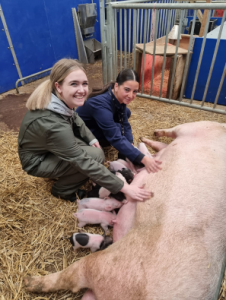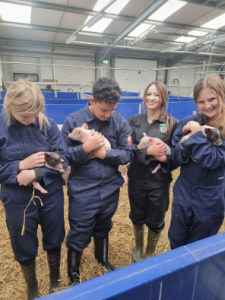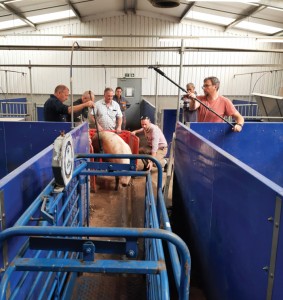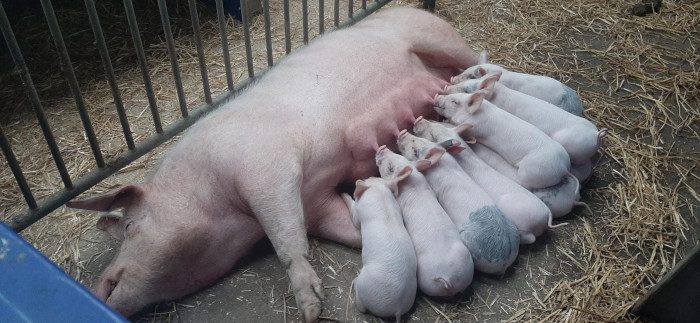Training and education of the next generation of pig farmers is well underway at the purpose-built Houghall campus of East Durham College. Vicky Lewis spoke to the team to find out how the training on offer is shaping the industry leaders of the future.
Offering land-based courses to over 850 students in the heart of County Durham, East Durham College’s Houghall campus 190-hectare farm has a full suite of arable crops, as well as grassland, and has made the perfect setting for a pig enterprise.
Complementing the existing suckler beef, calf rearing and sheep enterprises, the pig site gives students real world experiences and allows them to build on skills that they can replicate on farm. Farm manager Keith Cook and assistant manager Iain Whitfield have a wealth of experience to draw on, with assistants Amber Taylor and Leanne Chester representing the next generation of young farmers. Keith is keen to point out that this is a team effort, with farm and teaching staff all playing their part in preparing students for the farming industry.
APPETITE FOR PIG FARMING
For some not directly involved in the industry, pig farming can be a controversial subject, amid the noise created by vegan campaigners and calls to end ‘caged farming’. It would be easy for the college to focus elsewhere, but Houghall is keen to challenge and explore the issues. Promoting animal welfare alongside productive farming has been a key feature of the project’s success. Students have had their eyes opened to the pig farming process and have seen how the industry can be intensive, but also compassionate.
 Paul Flynn, director of farm and commercial activity at the college, said getting the students involved in the day-today running of the pig farm was key to the project’s success. “The students used to just come and muck out; now, I hope they see themselves as part of the production process. As young farmers they are seeing the potential and gaining an appetite for pig farming,” he said.
Paul Flynn, director of farm and commercial activity at the college, said getting the students involved in the day-today running of the pig farm was key to the project’s success. “The students used to just come and muck out; now, I hope they see themselves as part of the production process. As young farmers they are seeing the potential and gaining an appetite for pig farming,” he said.
For many students at Houghall, involvement with the enterprise is a common and popular activity, and not just for agricultural students. Animal management, foundation and undergraduate students all have their sleeves rolled up. Mucking out, feeding, farrowing and weaning are all on the list of jobs to be done, and students genuinely like what they see. For most, this comes down to the compassion and patience of the staff, regularly checking and adjusting to the needs of the pig.

Abby Dobinson, an animal management student at the college, explained that the input of the staff is vital: “The staff are what helps our college farms to be so ethical in the housing of our animals compared to larger pig units.” As the team has started to create a more commercial enterprise to pay the bills and better represent the industry, student engagement has improved and they’ve recognised the importance of attention to detail, particularly animal welfare. All this has enabled reinvestment and a better provision for both staff and animals.
Pig farmers are only too familiar with the narrow margins to be made and the considerable expense and financial risk involved in producing pigs. The pig unit needs to spend over £100,000 before it makes a reasonable return, but with nearly 400 students coming through the farm in a typical week, it has been one of its greatest teaching and learning assets. Lambing time and calving are always incredibly popular with students and staff, but students can now witness and support farrowing every three weeks and see the whole cycle of reproduction played out continuously. There is, of course, some cross-over to cattle and sheep farming. From conception to finishing, there are parallels throughout – managing body condition, health, nutrition and breeding are critically important to all livestock species. To justify the investment, the farm must meet ambitious targets and is aiming to be in the top 1% of UK producers.
AHDB’s knowledge exchange manager, Tony Bayles, has provided advice and guidance from the beginning of the project and has always been clear that, by utilising staff with strong livestock skills, with time and support, this will translate to successful pig farming.
IMPACT AND RESILIENCE
Pigs respond to good management and demonstrate the importance of attention to detail. Each of the Houghall pigs is weighed every week and the feed is weighed, too. This starting point for the management cycle has been invaluable. Farm manager Keith Cook said: “We’ve learnt something new every day! Feeding little and often to ensure good flow through the feed hoppers, adjusting the hoppers as the pigs grow and even closing the covers after mucking out have all made a visible difference.
“Competing with a commercial feed was a challenge. Pelleted feed had a much better feed conversion, 2.21 compared to 2.5, but we caught up on price. Next time we’ll convert to the finishing ration a little sooner and blend the two together as we do.”
Mr Flynn explained that the farm has already invested in a new feed mill and is able to grow much of the food needed on the farm. The team believe that, despite the drop in cereal prices, at the time of writing, they should recover some of the cost through feeding. The pig unit is costed at the highest crop price as the produce could have been sold.

With beans as a key ingredient, the area of beans in the rotation has been increased, reducing fertiliser costs while building soil fertility. Oilseed rape will be added to the rotation this autumn, producing both oil and rapeseed meal with the aim of further reducing the farm’s dependence on soya. Kingsgate Nutrition provide the expertise on the diets and with an additional balancer ration, they have turned the home-grown beans and barley into the perfect ration for each stage of development, from gestation and lactation to growing and finishing.
With help from Teesside University, the farm compared production against a commercial grower feed and, although feed conversion lagged behind, the figures were remarkably close.
Mr Flynn explained that planning and preparation has helped inform the rest of the farm: “The three-weekly cycle has been a great fit, with only one task each week– service, farrowing and weaning in alternate weeks.
“The benchmark data for pigs is really clear – we can see immediately where we need to be, and we’re encouraged by the rapid progress so far. Agrovision software is helping with this. All our staff, teachers and students have access to it and help is just a phone call away.”
Continuing the theme, the team has signed up to the Farm Business Survey, and will be accounting for every enterprise – even individual crops will be under scrutiny. Mr Flynn said: “We owe it to our students to try to demonstrate financial viability. We really look forward to seeing where we stand nationally.”
The business element of the enterprise is delivering a holistic teaching approach for the students, with dedicated business plans being developed and financial planning moving the project forward. The aim is for students to understand the requirements of planning and risk management. Mr Flynn said: “When the students go to the bank about their business plans in years to come, they will be able to successfully talk to the bank about planning and funding. Once they demonstrate a good farming acumen, banks will want to work with them.”
WHAT’S NEXT?
The college is keen to support new research, particularly in better animal welfare and more sustainable production. “We’ve also joined Harper Adams’ School of Sustainable Food and Farming, so now we’re open for business when it comes to sustainability and welfare research,” Mr Flynn added.
“We’re ready to go to market with an arm-long list of why the public should buy this meat! We already supply 2,500 students with as much sausage as they can eat; now it’s time for bacon!” With so much already in play, the college has big plans:
“We want to be a centre all about welfare, sustainability and responsibility. We want to make the process as sustainable as possible. And we want to change attitudes to the industry – one young person at a time.”
See more at: https://www.edc.ac.uk/




